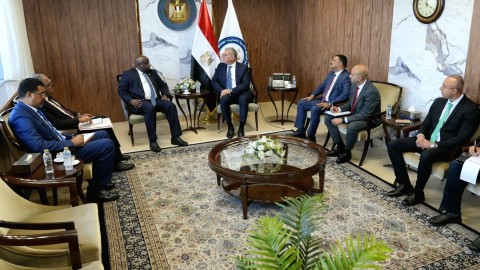Sudan said it has started confiscating some oil exports from South Sudan it believes it is owed to meet unpaid transit fees but will not shut down a pipeline carrying the southern state’s oil.
The US said Sudan’s move added to tensions with South Sudan, which became independent in July under a 2005 peace deal with Khartoum that ended decades of civil war. North and South Sudan have failed to sort out a long list of disputes.
The biggest conflict is over oil revenues – the lifeline of both economies. Land-locked South Sudan has two thirds of the former unified Sudan’s oil output but needs to pay fees to use northern export facilities.
The two countries have failed to agree on a transit fee but Reuters reported talks would resume on Tuesday, sponsored by the African Union in Ethiopia. Previous rounds ended with the parties wide apart.
Sudan has started confiscating southern oil to compensate for Juba’s failure to pay a fee to use Khartoum’s pipeline and the Red Sea port of Port Sudan, Reuters cited members of the northern delegation for the talks in Addis Ababa as saying.
“Since early December we’ve started taking part of our share after the southern government refused to agree on a deal for a transit fee,” Saber Mohammed Hassan, a member of the delegation, was quoted as telling reporters.
He said Khartoum was now demanding a pipeline fee of $36 a barrel, up from an initial demand of $32. Analysts have said Sudan’s demands were 10 times in excess of international norms usually based on a per-mile basis.
Reuters also cited delegation member Zubair Ahmed Hassan as saying Khartoum was taking some southern oil to use for northern refineries but gave no volumes.
South Sudan has accused Khartoum of blocking oil exports of 3.4 million barrels in Port Sudan and asking foreign oil companies to divert some oil to refineries in Khartoum and El-Obeid.
In a second demand, Khartoum wants Juba to pay a total of $1 billion for transit fees since July, another delegate, deputy central bank governor Badr el-Din Mahmoud, was quoted as saying.
He said South Sudan also owed Khartoum another $6 billion in debt. “The South has sent us a letter demanding $5 billion but this amount is not correct. We actually demand from the South $6 billion,” he said.
Sudan’s government is under pressure to overcome a severe economic crisis after losing the southern oil, which made up 90% of the country’s exports. It generated $5 billion in oil revenues in 2010.
“The national economy cannot do without oil,” said Idris Mohamed Abdul-Qadir, head of Khartoum’s delegation.
South Sudan has refused to shoulder Sudan’s foreign debt pile of almost $40 billion, which has been a burden for the economy for many years in addition to a US trade embargo deterring most Western companies.
The US said Khartoum’s action was fueling tensions with Juba.
“We are greatly concerned by recent Sudanese public threats and unilateral actions that impede the flow of oil from South Sudan, jeopardize the viability of the oil sector and increase tensions,” the US embassy in Khartoum said in a statement.
It said Juba should pay a “fair price” based on international norms and negotiate then a separate agreement to ease the impact of loss of southern oil on Sudan.
South Sudan has accused Khartoum of “stealing” its oil exports at the northern port of Port Sudan by ordering its security services to oversee the loading of 650,000 barrels of southern oil worth $65 million on a Sudanese tanker.
“The government of Sudan has chosen to steal this oil in broad daylight just days before its own proposed commercial oil negotiations with the Republic of South Sudan,” Reuters quoted South Sudan’s oil minister Stephen Dhieu Dau as saying in a statement on Saturday.
He said the oil pipeline would be closed within days since storage capacity was filling up in Port Sudan but director-general of Sudan’s Oil Exploration & Production Administration Azhari Abdalla, dismissed this, according to Reuters.
“What I can confirm from our side is we will not close any line. It will stay open. You can take this for granted,” Abdalla told Reuters.
The news agency also quoted South Sudan’s top negotiator Pagan Amum as saying oil companies had sent a letter to Khartoum verifying that South Sudan has paid for the use of oil infrastructure in Sudan since July.
“This letter makes it clear that the government of Sudan has no basis to demand any payment from the government of South Sudan because it has been paying and we cannot pay twice,” Amum told reporters in the southern capital Juba.
But northern delegate Zubair said since Sudan owned the pipeline it needed to be paid directly by Juba, not via companies.
Jean-Baptiste Gallopin, a London-based Sudan analyst at consultancy Control Risks, said differences between north and south were “irreconcilable.”
“Without an agreement the two countries remain engaged in a stand-off in which unilateral decisions lead to new political realities … on the ground. The risks of a gradual descent into renewed all-out conflict are real,” he said in a note.
Source: Upstream Online









